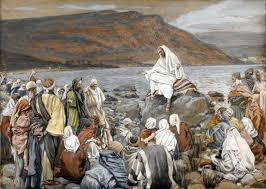
Glad Tidings in the Bible
As noted above, the Gospel itself means glad tidings, and to most Christians refer to resurrection and the salvation through Christ and the kingdom of God to come. It is also interpreted as to go and preach the Gospel to others.
Soon afterward Jesus began a tour of the nearby towns and villages, preaching and announcing the Good News about the Kingdom of God. He took his twelve disciples with him. Luke 8:1
It is interesting to note that the Arabic translation of Luke 8:1 uses the word ” بِشارَةَ ” (Bishara), which is derived from the same root as ” بَشِيرًا ” ( Bashiran -giver of good news), used in the Qur’an.
“The Spirit of the Lord GOD is upon Me, Because the LORD has anointed me to preach good tidings to the poor; He has sent me to heal the brokenhearted, To proclaim liberty to the captives, and the opening of the prison to those who are bound.” Isaiah 61:1
And how are they to preach unless they are sent? As it is written, “How beautiful are the feet of those who preach the good news!” Romans 10:15

Here are few other passages referring to preaching the “Good News” which refers to the Gospel itself. In fact the “Good News” for the following passages ( and Mark 15 and others) in King James version and New King James version IS translated as ‘gospel’.
So they began their circuit of the villages, preaching the Good News and healing the sick. Luke 9:6
One day as Jesus was teaching the people and preaching the Good News in the Temple, the leading priests, the teachers of religious law, and the elders came up to him. Luke 20:1
And the warnings in the Gospel
Jesus, as he appeared to his disciples after resurrection, gave these parting words of advice to them. In this passage, the message comes very close to that of the Qur’an- i.e. the glad tidings and the warning appearing side by side.
And then he told them, “Go into all the world and preach the Good News to everyone. Anyone who believes and is baptized will be saved. But anyone who refuses to believe will be condemned. Mark 16:15-16
Matthew 25 talks about the final judgment when people will be separated into those on the right and those on the left (a reference found several times in the Qur’an also). After describing the good ending (good news) for those on the right, the warnings for the evil doers appear in the form of describing the fate of those on the left on Final Judgment.
Then the King will turn to those on the left and say, ‘Away with you, you cursed ones, into the eternal fire prepared for the devil and his demons. For I was hungry, and you didn’t feed me. I was thirsty, and you didn’t give me a drink. I was a stranger, and you didn’t invite me into your home. I was naked, and you didn’t give me clothing. I was sick and in prison, and you didn’t visit me.’ Matthew 25: 41-43
‘Rejoice with those who rejoice’ image courtesy of Pintrest.com












